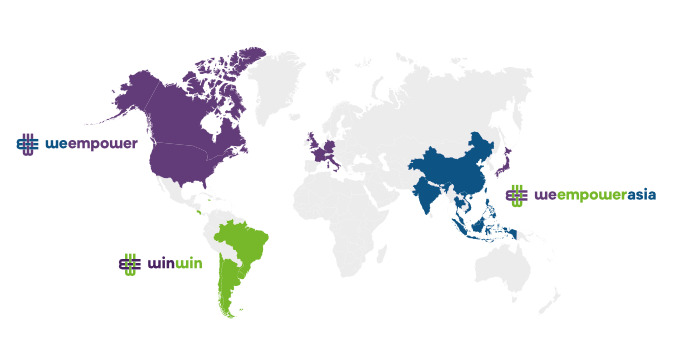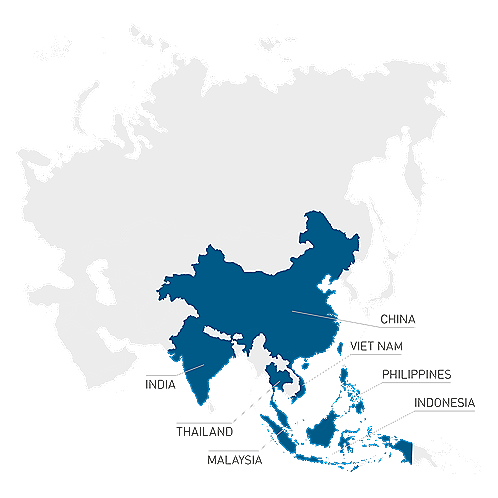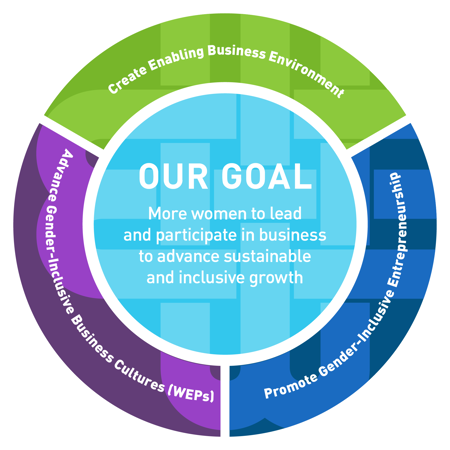Our Programme

Our Programme | The Issue | Our Vision | Our Solutions
Our Programme
WeEmpowerAsia is a joint programme by the European Union and UN Women aimed at increasing the number of women who lead and participate in private-sector businesses in China, India, Indonesia, Malaysia, the Philippines, Thailand and Viet Nam, thereby advancing inclusive and sustainable growth along with stronger links between European and Asian markets through gender-sensitive trade and supply chains.
The Issue
The Asia-Pacific region has undergone tremendous economic and social transformation in recent decades, as countries witnessed significant reductions in extreme poverty and increases to incomes and opportunities leading to progress across various Sustainable Development Goals. Yet rising prosperity has not been shared equally, and there are clear signs of the growing inequality within and between countries.
While the region has experienced strong economic growth, women’s labour force participation rate remains significantly lower than men’s. Progress on women’s empowerment has been slow and the economic gender gap remains particularly deep. The World Economic Forum’s Global Gender Gap Report 2020 finds that it will take another 100 years to close the global gender gap. That wait increases to more than 71 years in South Asia and 163 years in East Asia and the Pacific.1
When guaranteed equal opportunity, choice and access to resources, women’s full participation will multiply the capacity of the whole of society. By advancing gender equality, countries in the region could add US$4.5 trillion to their collective annual GDP by 2025, a 12 per cent increase over their business-as-usual GDP trajectory2. This data estimation is a strong indicator of the business case for women’s economic empowerment: a higher level of women’s economic participation means higher economic growth.
Recognizing the potential of women as a catalytic force for further socio-economic development, the WeEmpowerAsia programme works to advance women’s equality and gender-equal business opportunities in target countries.
Our Vision
WeEmpowerAsia:
- Promotes 7 Women's Empowerment Principles;
- across 7 countries in Asia;
- activating 700 companies;
- catalyzing 700 women entrepreneurs;
- impacting 700,000 people (employees, consumers and entrepreneurs);
- mobilizing 70 influencers; and
- contributing to at least 7 policy dialogues in the region.
Connected by their common goal, the programme furthermore leverages synergies and opportunities for cooperation with its two other EU-UN Women ‘sister programmes’ in the Latin American and Caribbean region (Win-Win) and in the G7 countries (WeEmpower) that are being implemented simultaneously.

The programme activities will enable core stakeholders and partners to collaborate, create and implement policies and initiatives that better meet women’s needs and rights in the economy, be it women as employees, managers or business owners.
Geographic Coverage: China, India, Indonesia, Malaysia, the Philippines, Thailand, and Viet Nam
Implementing Partners: UN Women and the European Union
Duration: 36 months (2019-2022)
Total Funding: 8,000,000 Euros

Our Solutions
WeEmpowerAsia’s main focus is on building a strong base of partnerships at and across the regional and country levels for women’s economic empowerment, including by:
- Creating an enabling business environment for women.
- Promoting women-owned businesses and gender-inclusive entrepreneurship.
- Advancing gender-inclusive business cultures (Women’s Empowerment Principles).
In short, the programme has adopted a three-pillar holistic approach to work:

For more information, please contact:
weempower.asia(@)unwomen.org
[1] Global Gender Gap Report 2020. World Economic Forum 2019.
[2] Power of Parity: Advancing Women’s Equality in Asia Pacific. McKinsey Global Institute 2018.
This website is produced with the financial assistance of the European Union. Its contents are the sole responsibility of the Regional Programme WeEmpowerAsia and can in no way be taken to reflect the views of the European Union.